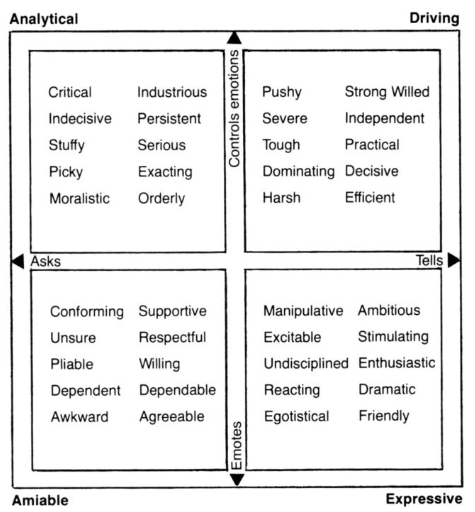Personal Styles & Effective Performance
I pride myself on being able to make effective decisions, quickly, with few details required. I am typically unemotional about the decision-making process and rely heavily on my ability to fix whatever problems may arise from a decision that was made too hastily. I place a heavy emphasis on goals and accomplishments, and strive to move forward on a project in order to achieve my objectives. In short, I have a driving personality style. People who share my love for quick decision-making typically describe me as: independent, practical, decisive, and efficient.
I also tend to ignore how others will feel about the decisions I make, and will typically leave people out of the decision-making process - when more people are involved in a decision, it results in too many opinions and communication inefficiencies. However, this can result in unwanted tension between me and others on my team who want their vote to count as equally as mine. In cases like this, people who share my love for quick decision-making are typically described as: pushy, dominating, tough, and harsh.
Wait. What? How is it that 50% of the time, I am applauded for my practical and decisive behaviors, and in the other 50% I'm pushy and harsh? In short, when I'm not at my best, my behaviors inject unproductive tension into a relationship - especially when I am approaching an interaction from a defensive state of mind. This tension can cause others to become defensive in their own way which forces the relationship into a vicious cycle.
Tension, which can have either a positive or negative effect on us, is a stimulus that causes us to act rather than to remain inactive... What we may not realize is that while we may be in our comfort zones when we behave in certain ways, we might be creating tension for someone else. - Personal Styles & Effective Performance
In Personal Styles & Effective Performance, David Merrill points out that a significant portion of the world's population has social and behavioral preferences that are different than yours. The key to successful and fruitful relationships is to understand the preferences of the people you interact with and adjust your behavior accordingly. This is called versatility.
When you succeed with social style, you understand what effects your actions can have on others. You know how to make your behavior say to someone else what you truly intend to say. - Personal Styles & Effective Performance

A high level of versatility, then, is the key behavioral ingredient that will cause people to describe you using the positive adjectives above, instead of the negative ones. In my case, one way to act with more versatility as a driver is to take extra time to listen to the perspectives of others and avoid taking action until everyone involved has had a chance to provide input.
The key to success in personal relationships is not to treat others how you would like to be treated, but rather to treat others how they would like to be treated.
Subscribe for Free
Want to stay ahead of the curve? Subscribe now to receive the latest updates, actionable insights, and thought-provoking ideas around business, technology, and leadership straight to your inbox.



